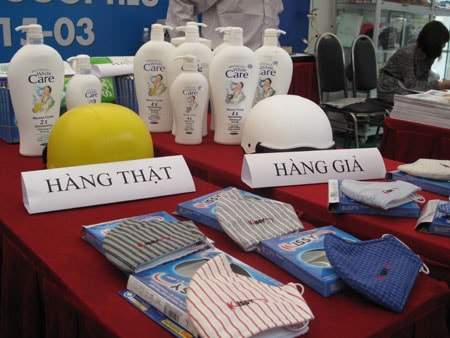Enforcement of the Law on Consumer Protection: Violations are still widespread
It has been nearly two years since the Law on Consumer Protection (CPP) was implemented, but violations of consumer rights have not decreased. Many businesses remain indifferent, and many consumers do not know how to apply the law to protect their rights.
Through the actual complaints at the Office of the Ho Chi Minh City Consumer Rights Protection Association, Ms. Phan Thi Viet Thu, Vice President of the Association, commented that consumers still do not care about their rights. For example, when buying goods, many people do not care about requiring sellers to provide sufficient information, products, manufacturer's warranty period, etc., so after purchasing, if they discover inappropriate features or defective products, they will be at a great disadvantage.
 |
| Many types of counterfeit goods attack consumers. |
Meanwhile, many businesses "ignore" their responsibilities. Many cases of consumers complaining about electronics sales centers or electronics supermarkets show that many businesses sell products of famous brands that have expired manufacturer's warranties but do not provide clear information. When selling, they give the store's or business's warranty card instead of the manufacturer's warranty card. When the product has a problem, consumers bring it to the manufacturer to request a warranty but are refused on the grounds that it has expired according to the date of manufacture.
A very common violation of consumer rights is keeping a vehicle without a receipt. When a vehicle is lost, the company refuses to compensate on the grounds that there is no parking receipt, so it cannot confirm that the customer parked the vehicle. This is the fault of both parties; the customer does not exercise his right to request the security guard to give him the receipt. On the contrary, the company also violates the consumer's rights by not accurately informing the customer about the transaction conditions, that is, if there is no parking receipt, it is not responsible for compensation if it is lost. This situation occurs frequently in parking lots and causes a lot of controversy, and most people tend to the view that without a parking receipt, the customer cannot claim compensation. Very few people know that the Law on Consumer Protection stipulates that organizations and individuals trading in goods and services are responsible for publicly announcing the general transaction conditions before transacting with consumers and must post them in a convenient place for consumers to see. If this is not done, they are forced to compensate consumers...
In fact, consumer rights have not been fully understood. According to Ms. Phan Thi Viet Thu, not only businesses but even state management agencies have violated consumer rights. A typical example is the case of the Ho Chi Minh City Department of Health Inspectorate not providing information about soy sauce containing the carcinogenic substance MCPD. Or there was a case where agencies caused people to fall into the situation of "ants climbing a dead branch". That was when reconciling a case of vehicle theft, the representative of the parking lot, Global Security Services Company, admitted its responsibility and promised to compensate the consumer immediately after the conclusion of the investigation agency. After many months, the case has not been resolved because the company is waiting for the conclusion of the police agency. Meanwhile, the police agency said that it had concluded the case but would only provide it when the service company requested it in writing. Too frustrated, NTD filed a lawsuit in court, but the court also required a police report to accept the petition, and the police only provided the report when there was a written request from the court...
Lawyer Nguyen Van Hau, Vice President of the Ho Chi Minh City Bar Association, said that Vietnamese consumers rarely react strongly to violations by businesses. In addition, state agencies are not effective in protecting consumer rights. Not only controlling counterfeit goods, fake goods, and goods with insufficient information on the market, state management agencies also need to step in to control the "advertising storm" that is attacking consumers. Because false advertising is also one of the acts that infringe on consumer rights. Thuy Linh
According to HNMO-TH
